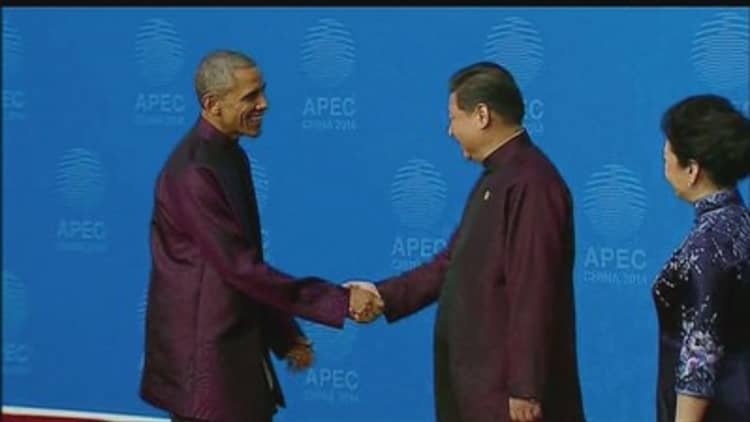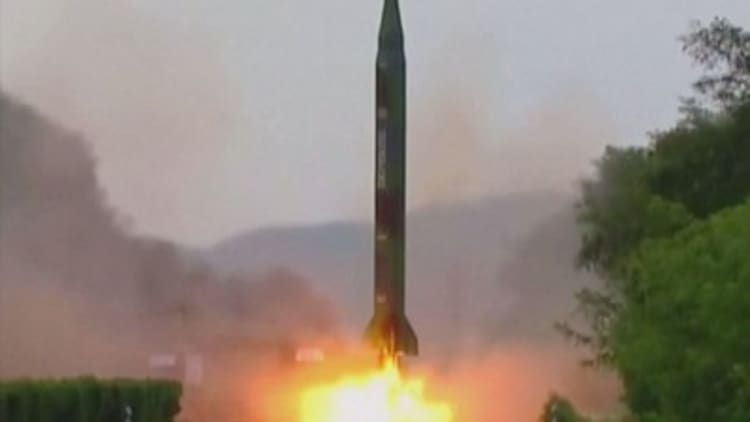
China is catching up to the U.S. across a wide range of sectors; major banks expect the economy to be the world's largest in the 2020s, while the yuan's expanding usage has sparked calls for it to replace the dollar as the world reserve currency.
But when it comes to nuclear weapons, the heavyweight nations are unlikely to cross paths anytime soon due to strategic policy differences.
In a new report, the Carnegie Endowment for International Peace notes the contrasting mentality and security paradigms behind nuclear decisions in each country.
"These disparities are not merely the result of differing security environments and levels of military strength; they also reflect differences in basic thinking because each country has developed its own nuclear philosophy in the process of implementing its security policy."
Here are a few key differences from the report.
Deterrence
The threat of retaliation in order to prevent an enemy attack, called deterrence, is a fundamental principle for the U.S. but not Beijing.
"Both Chinese and U.S. nuclear experts have long been perplexed by the differences in each other's approaches to nuclear deterrence. U.S. scholars believe that nuclear deterrence is appropriate, while Chinese scholars tend to believe that it has a strong intimidation effect. This difference is a problem," according to the report.
But the reason Beijing opposes deterrence is because it's confusing the idea with "nuclear compellance," the report flagged.
Whereas deterrence forces a rival to abandon an attack and thereby maintains the status quo, compellance is the idea that using a threat can force a rival to take action it does not wish to, which changes the status quo.
Washington distinguishes between the two ideas but apparently China does not.
"Chinese scholars take the position that various issues in a conflict are interrelated, and they pay close attention to conflict escalation," the report said. "Therefore, in their view, nuclear deterrence and compellence are indistinguishable."

Quantity
Russia boasts the world's largest inventory of nuclear warheads at 7,300, followed by the U.S. (7,100), France (300), China (260) and the U.K. (215), according to U.S. nonpartisan organization Arms Control Association.
"The U.S. considers the quantity of nuclear weapons it possesses a symbol of its global leadership," the Carnegie report explained. "Its position has always been that if the size of its nuclear arsenal is excessively reduced, it will not be able to guarantee the security of its allies."
Beijing, on the other hand, does not seek to use nuclear weapons to establish hegemony. Its decision to hold nuclear weapons is based on the fact that its arsenal is lean but effective, and it has never engaged in an arms race with another country, the report said.
"Lean but effective implies that China has chosen appropriate technology and deployment methods that allow its nuclear weapons to sufficiently deter nuclear attacks. China's nuclear weapons serve no other purpose."
Security paradigms
Both nations also have different definitions of what constitutes security concerns.
For China, lagging behind developed countries in economics, science, technology and military affairs represents a security challenge for policymakers because it leaves the country vulnerable, the report warned.
To avoid being caught helpless in the face of adversaries' new technologies, Beijing will master the latest innovations but that doesn't necessarily translate to deployment, the report continued.
"As far as China is concerned, what is important is ensuring that it has the technological leeway to avoid being caught off guard by new innovations. Yet U.S. scholars cannot fully comprehend this way of thinking, and China and the United States have almost never engaged in any serious dialogue about it."


